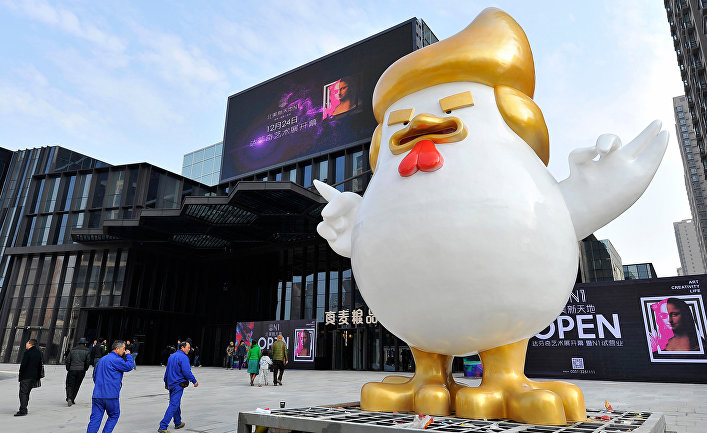
The administration of U.S. President Donald trump makes a major miscalculation, choosing the aggressive line toward China. She seems to be plotting the introduction of large-scale economic and political sanctions, starting with prohibitive duties, the recognition of China a “currency manipulator” and ending support for Taiwan and the rejection of almost 40 years of diplomacy based on the principles of so-called policy of “one China.”
Such a strategy will lead to a negative response. It is based on a mistaken belief that the United States, with their new muscles in the hands are all levers that affect the relationship with the alleged enemy and what the reaction of China, whatever they may be, can not be ignored. All this is very far from the truth.
Yes, the US is the largest export market for China, and thus the main Foundation of the stunning development of this country over the last 35 years. The closure of the U.S. market will undoubtedly have a negative impact on the growth of the Chinese economy.
However, the US has become heavily dependent on China, which is now the third largest and most rapidly growing export market for the United States. In addition, as an owner of US Treasury bonds and other dollar-denominated assets worth more than $1.25 trillion, China plays a key role in financing the chronic us budget deficit, in fact, giving back most of its excess savings in the USA credit that depressing way not able to save sufficiently to support its own economy.
This two-way relationship — the economic equivalent of the phenomenon, which psychologists call codependency — has deep roots. In the early 1980-ies, immediately after the Cultural revolution that turned the country’s economy in ruins, China was in desperate need of new sources of economic growth. The United States, after a destructive bout of stagflation in the late 1970s — early 1980s, also needed a new medicine for the economy. Experiencing difficulties American consumers solved both problems: they have become a powerful source of external support for the growth of the Chinese economy has benefited from low prices for goods made in China.
Thus, the two countries entered into an awkward marriage of convenience, meet the needs of both parties. China began to build an increasingly powerful economy, becoming the “main producer” (Producer Ultimate), and the United States began to turn into the “main user” (the Ultimate Consumer).
Like mutual reflection, the economies of the two countries were in more comfortable interaction, which, ultimately, called habituation, and so strong that two codependent partner was interested in shaping the economic identity of each other. USA opened China’s door to the world trade organization in 2001, and this was an important milestone on the way of turning China into a “main producer”. Meanwhile, the insatiable appetite of China for US treasuries in the early 2000s, helped to keep American interest rates low, creating bubbles on the asset market, allowing the “main consumer” to live greatly, not the means (while this music has not stopped playing in 2008).
As in the case of men, economic co-dependency ultimately is very destructive kind of relationship. Blinded by favorable phase of codependency, the US and China went the wrong way. Each of the partners were so absorbed in serving the interests of the other, that, in fact, suppressed their own feelings of economic “I”. And here lies the final trap of codependency: one of the partners inevitably begins to withdraw, to attack the other, trying to recover lost elements of self-identity.
It is here in this equation appears the trump criticizing China as a villain, which supposedly prevents America to be great. Trump has amassed a team of key advisors-associates in the trade, to plan this attack. Peter Navarro, as Director of the National trade Council, Wilbur Ross as Secretary of Commerce, Robert Leitheiser as US trade representative, Rex Tillerson as Secretary of state — level anti-Chinese sentiment in the new administration is unprecedented in modern history.
However, in their battle plan ignored critical risk: codependency is a very reactive form of relationship. If one partner changes their conditions, the other, feeling hurt, usually responds the same. After the provocative telephone conversation trump with the President of Taiwan, Cai Inwang December 2, shocked Chinese officials initially said almost nothing. But after strategy trump, who decided to set the heat to China, began to emerge (in the form of staff appointments and questions he began to raise), the official press of China has finally issued a warning that for their protection, the country could use a “big stick” if necessary.
All this is quite consistent with what can be expected from the reactive phase relationship of codependency, which is undergoing destabilization. The second partner, China, is threatening retaliation. And now America will have to face the consequences of their actions.
The administration trump, complacent, confident in the fact that the United States has nothing to fear, you can feel the power of Chinese retaliation. If the United States begins to implement his threats, it can be expected that China will respond with sanctions against the U.S. companies operating in this country, and, in the end, and tariffs on American imports, and it is unlikely to be of negligible value to the American economy, in dire need of growth. In addition, it can be expected that China will lose interest in buying U.S. Treasury bonds, which is potentially a serious problem when you consider that in terms of “trumpalaike” the Federal budget deficit will probably begin to grow.
However, the biggest tragedy for the United States can become a burden which all these changes will fall on the shoulders of American consumers. Policy under the slogan “America first” (whether it be at the expense of China or by so-called “leveling of border tax”, which, apparently, is a Central element of the proposed reform of corporate tax) will destroy many effective global supply chains that help keep prices of consumer goods in the US at a low level (e.g., Wal-Mart stores).
Given that income and jobs from American consumers for a long time have serious problems in its economic survival, they rely on the low prices. If Chinese politics trump will lead to higher prices, then more than all the rest, will lose the middle class.
Sino-American codependency creates terrible problems in the way chosen by trump’s strategy of punishing China. It opens up the ominous prospect of breaking the most important in the world economic relations, with potentially disastrous side effects for the rest of the world.







